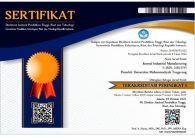ANALISA KESEIMBANGAN LINTASAN PRODUKSI PADA PEMBUATAN RADIATOR MITSUBISHI PS 220 DENGAN METODE RANKED POSITIONAL WEIGHT (RPW)
Abstract
Increasing demand for Mitsubishi Fuso FN 527 220 PS trucks will demand increased production of Mitsubishi PS 220 radiators at PT. Anugerah Aneka Industri. In making tank components through 2 processes, namely the press tank and tank assy. Making core components through 3 processes namely core assy, oven and end plate installing. Making end plate components through 1 process, namely the press end plate. Making side plate components through 4 processes, namely punch, shering, bending and spot. Then the components are assembled through 5 processes, namely tanks installing, installing side plates, leaks, painting, and packaging.
The purpose of this research is to get a standard working time and line balancing to provide additional information on the process of making Mitsubishi PS 220 radiator products so that it is easy to determine production work against consumer demand. Standard time is measured using the stop hour method, while line balancing uses the Ranked Positional Weight (RPW) method. Standard time and line balancing data is processed using Microsoft Excel 2016 software.
Finally from the results processing of standard time data and line balancing obtained the number of efficient workstations is 8 workstations, idle time 10.8 minutes, balance free time (balance delay) 12.36%, efficiency of production lines (line efficiency) 87.64%.
Key words : Workstation, Waktu Baku, Jam Henti, Line Balancing, Ranked Positional Weight (RPW).
Full Text:
PDF (Bahasa Indonesia)DOI: http://dx.doi.org/10.31000/jim.v4i1.1251
Article Metrics
Abstract - 2094 PDF (Bahasa Indonesia) - 2719DOI (PDF (Bahasa Indonesia)): http://dx.doi.org/10.31000/jim.v4i1.1251.g773
Refbacks
- There are currently no refbacks.













